
If you're an Airbnb host or guest, understanding chargebacks is important for your financial security. In simple terms, a chargeback is a process that allows you to dispute a charge on your credit card statement.
In the context of Airbnb, it means you can request your money back for a stay or transaction if you believe there's been an error or an issue. However, it's essential to know when and how to use chargebacks effectively.
Before we get into chargebacks, let's look at some alarming statistics. According to the Airbnb Fraud Report for 2021, there were 1,800 Airbnb fraud cases reported that year, resulting in fraudsters making an annual profit of $1.8 million. It marked a 20% increase in both the number of fraud cases and the annual profit compared to the previous year.
These numbers highlight the importance of understanding chargebacks and how they can protect your interests as an Airbnb user. So, whether you're a host or a guest, continue reading to explore this essential aspect of Airbnb transactions and how to navigate it.
Understanding Airbnb Payments
To understand how chargeback works in Airbnb it is important to navigate Airbnb's payment system to grasp the ins and outs of the process. Here, ChargePay will break down the key details so you can confidently handle your transactions on the platform.
1. Payment Methods
Airbnb collaborates with Stripe, a trusted payment processor, to ensure the safety of your transactions. They accept a range of payment methods to accommodate your preferences. These include:
- Credit Cards: Airbnb welcomes major credit cards like Visa, Mastercard, American Express, JCB, and others.
- Debit Cards: Most debit cards that can be processed as credit cards are also accepted.
- PayPal: If you prefer to use PayPal, you can do so for your Airbnb payments.
- Apple Pay and Google Pay: For added convenience, Airbnb supports these digital wallet options.
- Airbnb Credits: If you have Airbnb credits, you can apply them towards your bookings.
The payment methods available to you may vary depending on your location.
2. Payment Plans
If you're looking for flexibility in managing your payments, Airbnb offers payment plans under certain conditions:
- Reservation Amount: Payment plans are available for reservations totaling USD 50 or more, inclusive of taxes and fees, minus any applicable credits or coupons.
- Lead Time: Your reservation's start date must be at least 14 days in the future.
- Accepted Payment Methods: Payment plans are accessible when you're using a credit card, debit card, PayPal, Apple Pay, or Google Pay.
To opt for a payment plan, you'll find the "Pay over time" option during the checkout process. You can select to pay in installments of 25%, 50%, or 75% of the total reservation cost. The initial installment will be charged immediately, with the remaining installments processed on the dates provided at checkout.
3. When Hosts Receive Payment
It's important to note that Airbnb hosts do not receive payment right away. To ensure that both you and the host are satisfied with the arrangement, payment is transferred 24 hours after your scheduled check-in. This grace period allows for any final checks and ensures everything aligns with your expectations. If you encounter any issues with the listing during this time, you can reach out to Airbnb for assistance or request a refund.
4. Resolving Payment Problems
In case you encounter any payment-related problems while using Airbnb, such as a declined card or an unauthorized charge, don't fret. Airbnb's customer support is ready to assist you. They can provide the necessary guidance and help resolve any issues you may face.
For more detailed information on Airbnb payments or to seek answers to specific payment-related queries, you can explore the Airbnb Help Center. It's a valuable resource that can offer further clarity on payment processes and troubleshooting.
What is a Chargeback?
A chargeback is when a payment you made gets reversed, and you get your money back. It's like a safety net for buyers to make sure they're treated fairly. Let's say you booked a place on Airbnb, paid for it, and something's not right like the place isn't as described or there's a billing error.
You can ask your bank to do a chargeback. They investigate and, if things check out, you get your money back. It's a way to protect your money in case something goes wrong with your Airbnb booking.
Airbnb Chargeback Examples to See How It Works?
Chargebacks can be a real headache when you're an Airbnb host. VA Loan Mama, a TikTok creator, recently shared her Airbnb hosting ordeal, and it's a cautionary tale that sheds light on what a chargeback is and why it can be a major problem.
In a TikTok video from August 26, 2023, VA Loan Mama detailed her experience with a troublesome guest. She had a guest who threw a wild party, trashed her house, left bullet casings in the kids' playroom, and even made off with towels and an Xbox controller. To add insult to injury, VA Loan Mama had only charged this guest $150 for all the damages.
What's worse, this guest decided to file a fraudulent chargeback claim for her entire stay, including the $150 fee. But here's the kicker – VA Loan Mama was prepared. She had legal agreements, a rental agreement, a copy of the guest's photo ID, and her home address.
VA Loan Mama emphasizes that she takes steps to "secure everything" when renting out her place to avoid such issues. Faced with this situation, she debated whether to share Ring videos of the guest entering and leaving the residence while stealing and partying.
The host pointed out that defrauding an innkeeper can lead to a hefty penalty of five years in jail. She made it clear that she wasn't going to let this slide.
In subsequent videos, VA Loan Mama continued to document the incident. She showed Ring footage and even shared text messages that contained images of the bullet casings. And believe it or not, the guests left a cooked chicken in the bed – it was that kind of party.
To seek justice, VA Loan Mama took active steps towards pursuing a 'defrauding an innkeeper' charge against the guests. She reached out to a Crime Stoppers hotline, which advised her to file a police report.
Following their guidance, she contacted the police department, provided the necessary details about the incident, and was directed to the Osceola County sheriff's office. There, she was told to make an in-person report.
In a final update, VA Loan Mama mentioned that she submitted evidence to the guest's bank, and they promised to review the information and respond by October 1, 2023. She also planned to visit the sheriff's department to file the official reports.
This real-life incident illustrates what a chargeback is and how it can impact Airbnb hosts. It's a cautionary tale that emphasizes the importance of transparency, documentation, and taking legal action when necessary to protect hosts' interests.

6 Reasons for Chargebacks on Airbnb
There are several reasons why guests might decide to initiate a chargeback on Airbnb. These are common scenarios where chargebacks come into play:
1. Unauthorized Charges
If you spot a charge on your credit card statement that you didn't authorize, it's natural to be concerned. Guests may file a chargeback if they believe the charge is unauthorized. This could be due to various reasons, such as a fraudulent transaction, an error made by Airbnb, or a dispute about the reservation's terms.
2. Incorrect Charges
Guests may consider filing a chargeback if they feel they've been billed incorrectly. For instance, they might have been charged for nights they didn't stay, or they may have been hit with extra fees they weren't informed about in advance.
3. Unsatisfactory Stay
When your stay doesn't live up to your expectations, it can be frustrating. A guest might initiate a chargeback if they're dissatisfied with their stay for various reasons. This could include finding the property dirty or damaged, the amenities not matching what was advertised, or having difficulty getting in touch with the host.
4. Host Cancellation
Sometimes, a host may cancel a reservation at the last minute, leaving the guest in a bind. In such cases, if the guest can't find alternative accommodations, they may resort to filing a chargeback to recoup their expenses.
5. Access Denied
In the unfortunate situation where a host denies a guest access to the property, the guest may have no choice but to seek a chargeback as they won't be able to use the accommodation they paid for.
6. Property Damage
On occasion, a guest may accidentally or intentionally damage the host's property during their stay. In response, the host might initiate a chargeback to cover the costs of repairs or replacements.
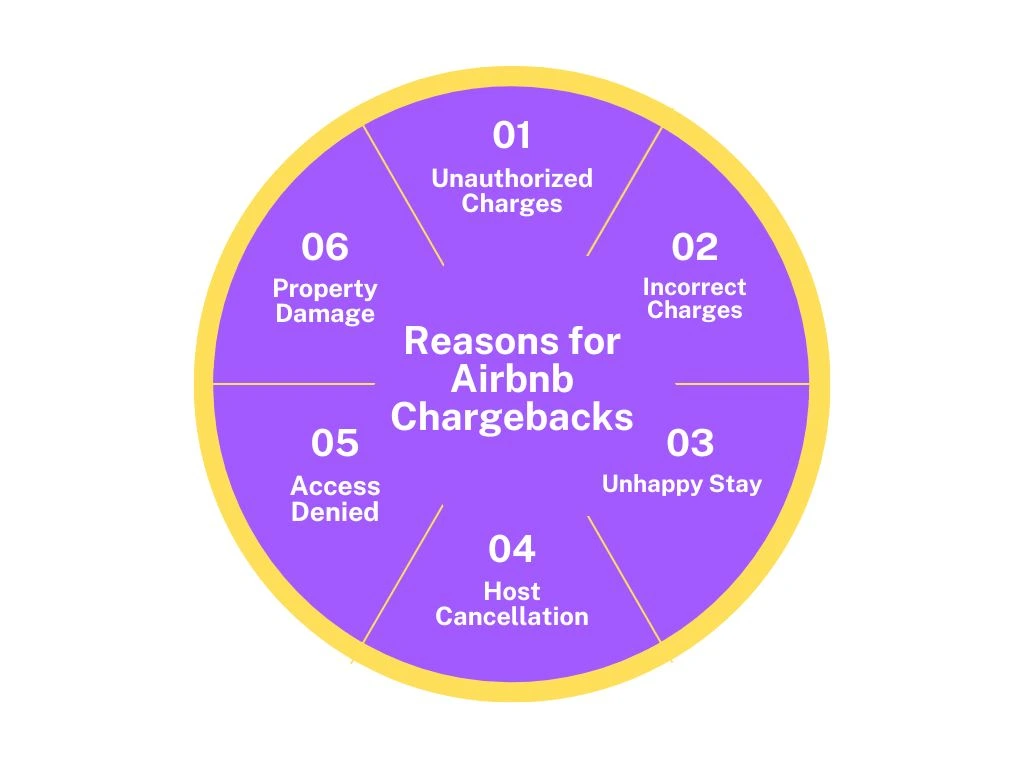
It's crucial to understand that chargebacks can be both financially burdensome and time-consuming for hosts. Therefore, it's in everyone's best interest to take steps to prevent them. This includes being crystal clear and accurate in your property listings, maintaining open and timely communication with guests, and promptly addressing any issues that may arise fairly and efficiently. By doing so, you can minimize the likelihood of chargebacks and ensure a smoother experience for both hosts and guests on Airbnb.
Impact of Chargebacks on Airbnb Hosts
Chargebacks can be a real headache for Airbnb hosts. These payment disputes can disrupt your hosting experience and affect your income. Here's a closer look at how chargebacks impact Airbnb hosts:
1. Financial Hit
Chargebacks mean you lose money. If a guest disputes a charge on their credit card, the funds you thought were secure can vanish. This can be a significant financial loss, especially if you rely on Airbnb for extra income.
2. Unexpected Uncertainty
Chargebacks can happen unexpectedly, leaving you in a state of uncertainty. You might have already paid for cleaning or repairs, only to find out the money's gone due to a chargeback. It's like a financial curveball that you didn't see coming.
3. Reputation Matters
In the world of Airbnb, your reputation as a host is paramount. If a chargeback goes against you, it can affect your hosting reputation. Lower ratings can make future guests hesitant to book your place, leading to a drop in bookings.
4. Time-Consuming
Dealing with chargebacks is a time-consuming process. You'll have to gather evidence, communicate with Airbnb, and maybe even go through a dispute resolution. All that takes time and effort you could spend elsewhere, like improving your listing or hosting your guests.
5. Trust Concerns
Chargebacks can make you skeptical about guests. You might start to wonder if every guest is potentially a chargeback waiting to happen. This skepticism can strain the trust that's crucial for a positive hosting experience.
6. Potential Penalties
If you experience too many chargebacks, Airbnb might penalize you. They could limit your ability to accept bookings or even suspend your account. These penalties can have long-term consequences for your hosting business.
Airbnb's Chargeback Policy
Airbnb's Chargeback Policy is a straightforward process designed to protect guests in case of payment disputes. If you feel that a charge from Airbnb is incorrect or unauthorized, you have the option to initiate a chargeback with your bank or credit card company.
1. Here's how it works
- Contact Your Bank or Credit Card Company: If you have a valid reason to dispute a charge from Airbnb, the first step is to get in touch with your bank or credit card company. They are the ones who can help you with the process.
- Provide Necessary Information: Your bank may ask you for additional information regarding the disputed charge. This could include any relevant documentation or evidence of the problem you encountered.
- Bank Investigation: Once you file a dispute, your bank will investigate the claim. They will review the provided information and decide the dispute result.
- Valid Chargeback: If your bank finds that your chargeback request is valid, they will reverse the charge and refund the money back to your account.
- Notification to Airbnb: Airbnb will be notified of the chargeback by your bank. They might also conduct their investigation into the matter.
- Airbnb's Response: If Airbnb determines that the chargeback is not valid, they may dispute it with the bank on their end. This can involve providing evidence and documentation to support their case.
- Consequences for Guests: If a chargeback is upheld by the bank, Airbnb may take action against the guest. This could include suspending or banning their Airbnb account.
Airbnb's Chargeback Policy also emphasizes that guests should first attempt to resolve issues directly with their host before resorting to a chargeback. You can contact your host using Airbnb's messaging system. If the issue remains unresolved, you can reach out to Airbnb's customer support for assistance.
One important thing to note is the timeframe for initiating a chargeback. According to Airbnb's policy, you should initiate a chargeback within 120 days of the charge date. If you wait beyond this period, your bank or credit card company might not be able to assist you.
11 Steps to Prevent Chargebacks for Hosts
As an Airbnb host, preventing chargebacks is crucial for a smooth hosting experience. Chargebacks can lead to financial losses and affect your reputation. Here are practical steps you can take to minimize the risk of chargebacks:
1. Verify Guest Identity
- Ensure that the guest's profile information, including their profile picture and reviews, matches their identity.
- Consider using Airbnb's Verified ID feature for added security.
2. Clear Communication
- Maintain open and transparent communication with your guests.
- Address their questions and concerns promptly to avoid misunderstandings.
3. Accurate Property Descriptions
- Provide detailed and accurate descriptions of your property, including its size, amenities, and any potential limitations.
- Use high-quality photos that honestly represent your listing.
4. Managing Expectations
- Set clear expectations about check-in and check-out times, house rules, and any additional charges.
- Communicate any special terms or conditions in advance.
5. Providing Exceptional Service
- Ensure that your property is clean, well-maintained, and meets the standards you've advertised.
- Be responsive to guest inquiries and address any issues promptly.
6. Secure Payment Processing
- Use Airbnb's secure payment system for all transactions.
- Avoid asking guests for payments outside of the Airbnb platform.
7. Document Everything
- Keep records of all communication with guests, including messages, emails, and any agreements.
- Document any damages or issues with photos and descriptions.
8. Have a Strict Cancellation Policy
- Implement Airbnb's cancellation policy that aligns with your hosting preferences.
- Ensure guests are aware of the cancellation terms before booking.
9. Security Deposits
- Consider setting up a security deposit to cover potential damages.
- Communicate the deposit amount and the conditions for its return.
10. Provide a Welcome Guide
- Create a detailed welcome guide with essential information about your property, nearby attractions, and emergency contacts.
- Share this guide with your guests upon their arrival.
11. Respond to Guest Reviews
- Engage with guest reviews and address any concerns or issues raised by previous guests.
- Show that you are committed to improving the guest experience.
By following these steps, you can significantly reduce the risk of chargebacks, create a positive hosting experience, and build a strong reputation as a trustworthy Airbnb host. Remember, proactive prevention is key to ensuring a hassle-free hosting journey.
Initiating a Chargeback as a Guest
When you've had an issue with your Airbnb stay that you can't resolve with your host, initiating a chargeback might be an option to get your money back. Here's a simple guide on how to do it:
Step 1: Contact Your Host First
Before you jump into the chargeback process, reach out to your host to discuss the problem. They might not even be aware of the issue and could be willing to resolve it. It's always best to try and resolve things directly.
Step 2: Gather Evidence
If you can't reach an agreement with your host, start collecting evidence. This can include photos, messages, and any other documentation that supports your claim. It's important to have a clear record of the issue.
Step 3: Contact Airbnb
If talking to your host and providing evidence doesn't work, contact Airbnb. You can do this through the Airbnb website or app. Explain the problem and provide all the evidence you've gathered.
Step 4: Wait for Airbnb's Response
Airbnb will review your case and make a decision. This might take some time, so be patient. They'll consider the evidence from both you and your host before concluding.
Step 5: If Airbnb Doesn't Help, Contact Your Bank
If Airbnb doesn't resolve the issue in your favor, and you believe you have a valid reason for a chargeback, contact your bank or credit card company. Explain the situation and provide all the documentation you've collected.
Step 6: Follow Your Bank's Instructions
Your bank or credit card company will guide you through the chargeback process. They'll investigate the issue and make a decision based on the evidence provided.
Step 7: Keep Records
Throughout the entire process, it's crucial to keep records of all your communications with Airbnb, your host, and your bank. This will be important in case you need to provide additional information or if there are any disputes later on.
Remember, chargebacks should only be used as a last resort when you've genuinely experienced an issue that couldn't be resolved through other means. Using chargebacks for frivolous reasons can have consequences, so it's essential to use this option responsibly.
Common Misconceptions about Airbnb Chargebacks
With Airbnb chargebacks, quite a few misconceptions are floating around. It's important to clear the air and set the record straight. Here, we'll address some of the common misconceptions about Airbnb chargebacks:
1: Chargebacks are the Same as Refunds
Some people think chargebacks and refunds are the same. They're not. A refund is when Airbnb gives your money back, usually due to a problem with your stay. Chargebacks, on the other hand, involve your credit card company stepping in to reverse a transaction.
2: Chargebacks Are an Easy Way to Get Your Money Back
It's not as simple as it sounds. Chargebacks should be your last resort. You can't just dispute any issue and expect to get your money back. Your credit card company needs valid reasons, like unauthorized transactions or fraud.
3: Chargebacks Don't Affect the Host
Some guests believe that initiating a chargeback won't hurt the host. That's not true. Chargebacks can hit hosts hard, affecting their income and reputation. It's a serious matter that should be used responsibly.
4: Chargebacks Can Be Used for Minor Issues
Chargebacks are not a tool to complain about minor inconveniences like a noisy neighbor or a minor cleanliness issue. They are meant for more significant problems like not getting what was promised in the listing.
5: Airbnb Will Always Side with Guests in Chargebacks
Airbnb plays a neutral role in chargeback disputes. They look at evidence from both sides before making a decision. They won't automatically side with the guest. It's a fair process.
6: Chargebacks Don't Require Evidence
To win a chargeback, you need solid evidence. Your credit card company won't take your word for it. You must provide documentation like emails, photos, or other proof to support your claim.
7: Chargebacks are Quick and Easy
Chargebacks take time. It's not an instant solution. You'll need patience as the credit card company investigates the case. It can take weeks or even months.
8: Hosts Can't Leave Reviews for Guests Who Initiated Chargebacks
Hosts can still leave reviews for guests who initiated chargebacks. Airbnb encourages honest and fair reviews to help others make informed decisions.
9: Chargebacks Have No Consequences
Wrong again. Frequent chargebacks can have consequences for guests and hosts alike. It can lead to restrictions, account suspensions, or even legal actions in extreme cases.
Manage & Recover Chargebacks with ChargePay
Are chargebacks causing disruptions in your business? Streamline your chargeback management effortlessly with ChargePay, the ultimate solution for hassle-free recovery.
ChargePay harnesses the power of AI to help businesses automatically contest and win up to 3.5 times more chargebacks, all without the need for manual effort. Whether you operate in the travel industry or any other sector, ChargePay has got you covered.
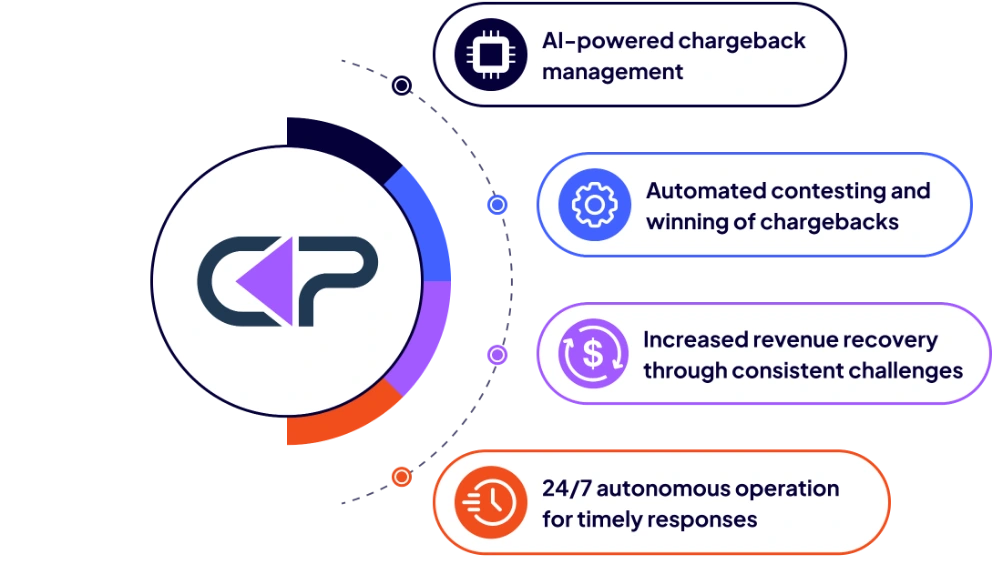
It seamlessly integrates with over 30 payment processors, making it versatile and adaptable to your specific needs. With a smart dashboard and easy-to-use interface, tracking and managing chargebacks becomes a breeze.
As you embrace ChargePay, you can reclaim over 80% of the revenue that is typically lost to chargebacks, fueling the growth of your business. Not only does ChargePay recover lost revenue, but it also safeguards your reputation with acquirers and issuers.
The result? You can recover 3.5 times the industry average in successful chargeback wins, making it a game-changer for your business. Say goodbye to the manual struggle of handling chargebacks and hello to a trusted, efficient partner in ChargePay. Start today and watch your revenue soar, all while you sleep.
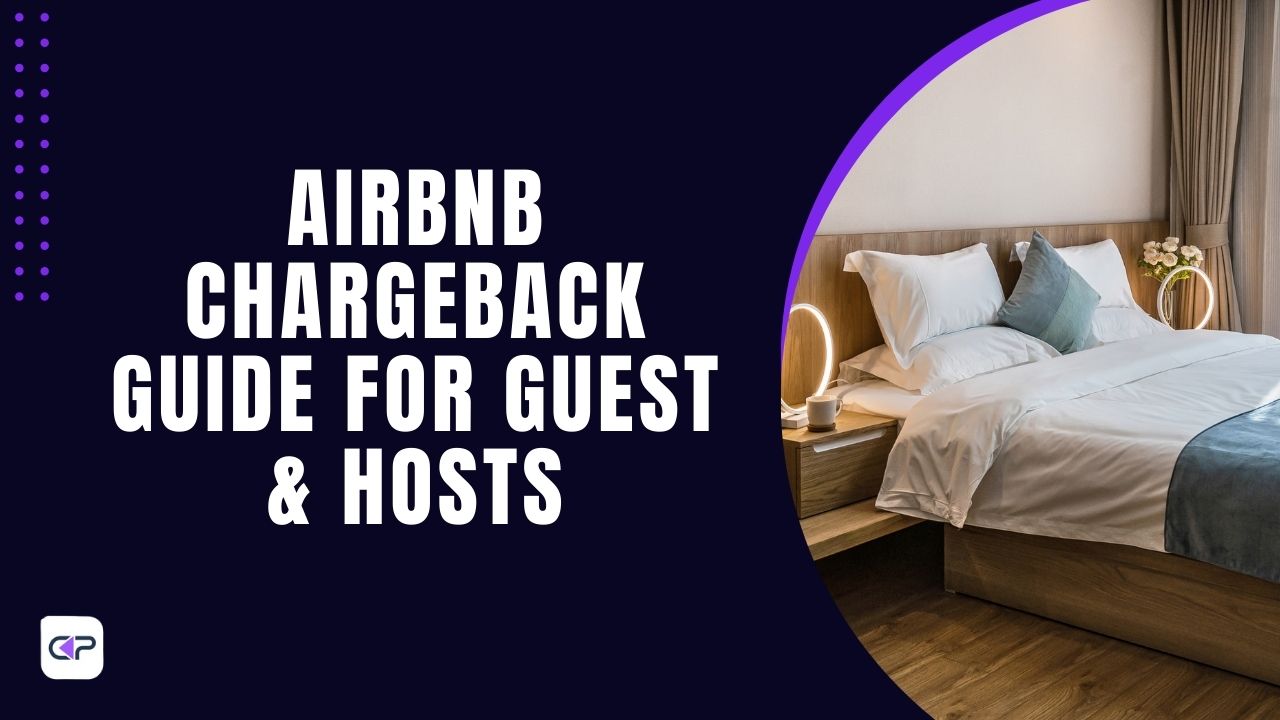


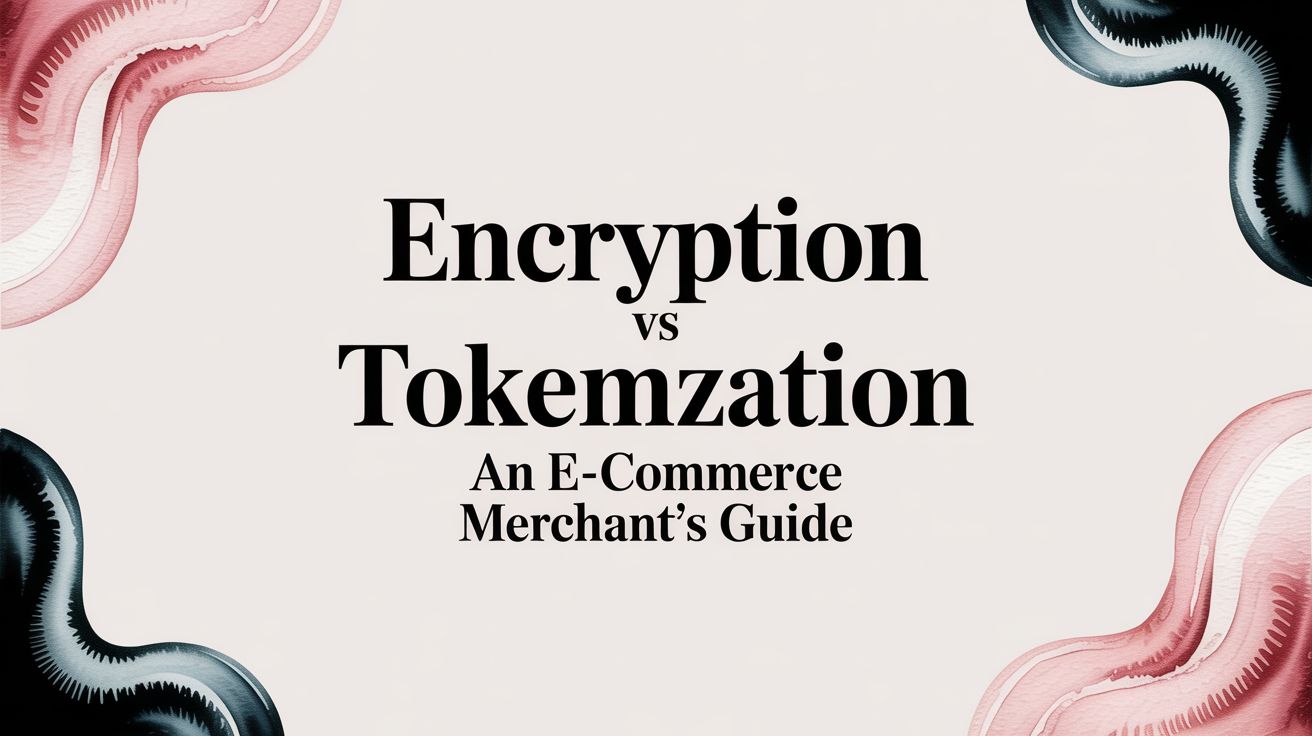
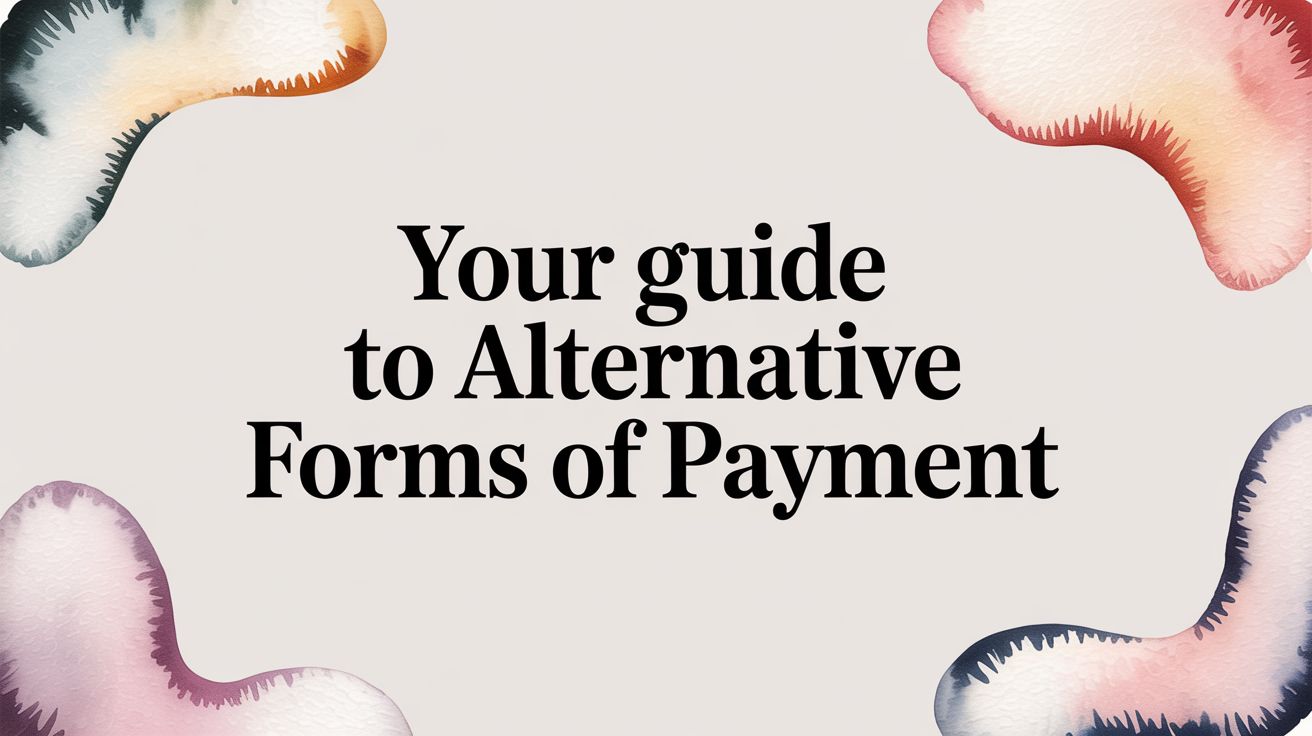
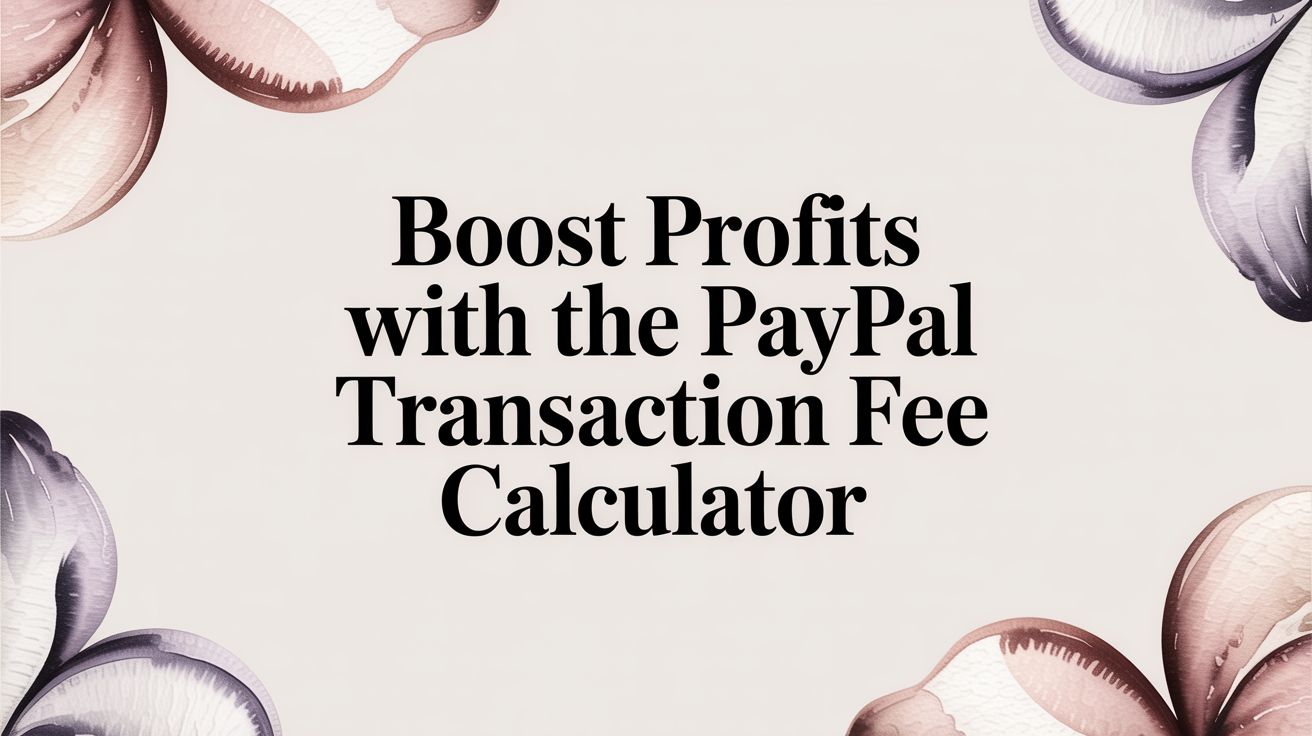

.svg)







.svg)
.svg)
.svg)